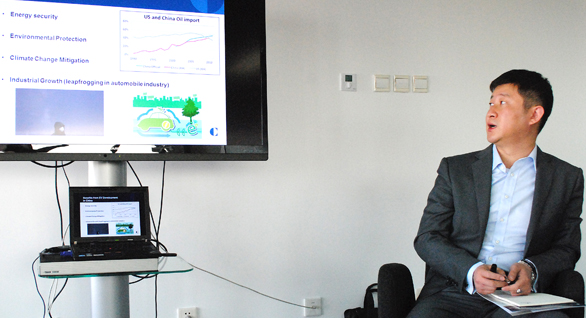Registration
You will receive an email confirming your registration.
Despite strong efforts by the Chinese government to stimulate electric vehicle use, the sector still holds a very small share of the overall Chinese vehicle market. However, increasing concerns about pollution, health, and energy security in China highlight the need to improve the current electric vehicle policy and boost sales, usage, and technological development.
Carnegie-Tsinghua’s Wang Tao recently released a policy outlook with concrete, sustainable solutions on how China can better support its burgeoning electric vehicle industry. He presented his findings in a public lecture to journalists, students, scholars, and industry leaders..
Reasons for Electric Vehicle Development
Wang discussed how electric vehicle development could help address China’s existing energy and environmental concerns while stimulating the country’s economy.
- Increasing Energy Security: China is already the world’s largest importer of foreign oil. Wang explained that electric vehicle development would lessen China’s dependence on oil, especially from the Middle East, and protect China from possible supply shocks.
- Electric Vehicles’ Environmental Benefits: Pollution from millions of vehicles on the road is difficult to regulate. Shifting toward electric vehicles could significantly remove pollution from city centers, reduce the rate environmental degradation, and vastly improve public health, Wang said. Promoting an increased use of electric vehicles could also be a critical step in China’s efforts to curb carbon emissions in the fast-growing transportation sector.
- Stimulating Industrial Growth: Based on the increased use of electric vehicle rental services, demand for electric vehicles overall has grown. With this rising demand, Wang argued that research and development in electric vehicle technologies would facilitate industrial development and economic growth in the high-tech sector.
Barriers to Electric Vehicle Development in China
Current electric vehicle policy does not effectively address the barriers to developing a sustainable electric vehicle industry, Wang argued. In addition, there are not enough policy incentives for private consumers to purchase and use electric vehicles.
- Reluctant Manufacturers: Many firms are reluctant to invest in a still small market. This lack of market demand indicates little return on their investment in the technology. While most firms realize the potential size of the future electric vehicle market, none have been willing to take the necessary steps to invest and raise demand, Wang said.
- Lack of Business Model: Existing electric vehicle policy does not focus enough on creating a sustainable business model, Wang argued. The current policy relies too heavily on subsidies and does not focus on ways to increase actual usage. Wang cited electric taxi fleets as an example of unsuccessful promotion of electric vehicle usage because the long battery-charging times rendered them ineffective.
- No Incentive for Consumers: Owners of electric vehicles currently do not receive enough preferential treatment on China’s roads, Wang contended. Although they receive subsidies to offset the cost of purchase, electric vehicle owners must still abide by license plate regulations and do not receive any additional driving privileges to incentivize the use of electric vehicles.
Policy Recommendations
Current electric vehicle policy is focused too heavily on subsidies and sales targets, Wang concluded. New policies should instead focus on increasing consumer demand and promoting the usage, not only the sales, of electric vehicles.
- Open Market to Foreign Competition: Opening the electric vehicle market to foreign competitors would allow technological cooperation to improve the current infrastructure and quality, Wang argued. The electric vehicle market remains a niche market in China and thus is not sensitive to the price of goods. Allowing high-end electric vehicle brands to enter the Chinese market would push domestic brands to raise the quality of their vehicles. Wang cited China’s high-speed railways, nuclear technology, and wind power as examples of how foreign competition has raised the domestic quality as well.
- Commercial Operations: Electric vehicle policy should facilitate electric vehicle use in new areas such as delivery service vehicles, he added. Such vehicles have a fixed route, short distance, and scheduling flexibility, which would allow for smooth integration of electric charging infrastructure.
- Consumer Incentives: Electric vehicle users should be given certain privileges in order to drive up demand and usage. Wang recommended the Chinese government allow electric vehicle users to bypass the license plate lottery in Beijing and use the bus lanes.
- Self-Sustaining Business Model: Wang explained how current electric vehicle policy emphasizes the number of vehicles sold. Instead, policymakers should be focused on developing a self-sustaining business model to stimulate investment in electric vehicle technology and infrastructure.
